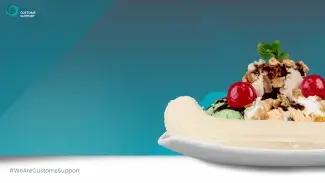First, the star of the show: the humble banana
Cut it lengthways, and lie it on either side of your plate. All the ingredients go between these two halves to “split” this banana.
As a plant and a food product, you wouldn’t be wrong in assuming that a phytosanitary certificate is required for bananas during the import process. However, you do not need one when importing bananas into either the EU or the UK.
You still need to pay duty when importing bananas, but this is not done using the value like most goods. Instead, your duty will be determined using the net weight.
If you are importing packaged instead of bulk bananas, you need to advise an average weight per piece and the number of pieces. Customs may take some samples to check this weight is true upon entry.
Add your ice cream balls
Whether you choose chocolate, strawberry, vanilla, or a mix of all three flavours, the core of the banana split is made up of ice cream – a dairy product which is a product of animal origin.
When you are bringing ice cream into the EU or UK, you need to complete health checks during the import clearance to show that the ingredients meet standards.
You will need an ingredients list, as well as a health certificate for the milk that was used to create the ice cream.
Squirt on some whipped cream
Despite being another milk product, the tariff code for cream is different to iced cream.
Like most dairy products like milk and cheese, cream belongs to chapter 04, whereas ice cream is amongst the miscellaneous edible products in chapter 21. Health checks are applicable to either.
There is zero VAT applied to imports of cream, and the duty is also calculated by weight instead of value.
Throw on some chopped nuts
Lightly toasted in some salt and sugar, of course!
Whether you are importing peanuts, hazelnuts, almonds, or another nut into the UK, you may need an aflatoxin certificate. This will depend on the nut chosen and your country of origin, so check with your customs consultant to find out if you need one.
And drizzle chocolate sauce over the top to finish!
Did you know that chocolate does not always need further health checks, despite the inclusion of milk in most? This is because chocolate is usually classed as confectionary, not a product of animal origin.
However, there are some standards that you need to be aware of, depending on where you are importing to, the origin, and the ingredients. For example:
- Chocolates containing fresh cream are classed as products of animal origin and require health certification checks.
- Some territories, like the EU, have a cap on the amount (by percent) of vegetable oils that can be included in the final product.
- Chocolates containing nuts or fruit may require further checks on the supply of these ingredients.
Check with your customs consultant if you are unsure when changing suppliers or trade lanes.
We are Customs Support – keeping your food trade a-peeling!
Strategically located in more than 13 countries across the EU and the UK, our experts are on hand to discuss your local requirements for import and export clearances surrounding food.
Once you’re done tucking into your banana split, contact us for more information.














